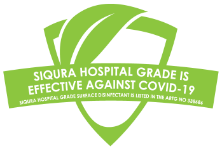Personal hygiene and keeping your home clean can help break the chain of transmission when it comes to viral infection.
With hygiene in mind, here are 4 important things to remember when it comes to your home and your health during this time.
1. Handwashing is more effective than sanitisers
We know it’s not always possible, but handwashing with soap and water is the cheapest and most effective form of infection control.
So much so, that research carried out by MIT suggests that increased handwashing at just 10 airports in the US would reduce the spread of the coronavirus by 60%.
The Australian Department of Health (DOH) and US Centers for Disease Control and Prevention (CDC) recommend thorough handwashing (for at least 20 seconds) over hand sanitiser to help protect yourself and others from the spread of infection.
Why is handwashing preferable? It’s simply more effective overall.
According to the CDC, handwashing reduces the amounts of all types of germs, whereas sanitisers eliminate some, but not all types of germs.
If used correctly, alcohol-based sanitisers can inactivate many microbes, however, many people don’t use enough sanitiser or accidentally wipe it off before it has dried.
If you’re unable to access water and hand soap, a sanitiser is a good alternative.
Make sure the sanitiser is at least 60% alcohol-based, read the label and apply the recommended amount. Keep rubbing your hands together until they are completely dry.
When should you be washing your hands and sanitising?
The DOH recommends thorough handwashing whenever you cough, sneeze or blow your nose, whenever you touch your face, prepare food, use the bathroom or care for someone sick.
2. Disinfecting and sanitising won’t work on a dirty surface
We recently discussed the difference between cleaning, sanitising and disinfecting.
A really important point: sanitising and disinfecting is ineffective if the surface hasn’t been hygiene cleaned.
Cleaning is a key step to sanitise and disinfect effectively that most people ignore, even though studies show that chemicals like bleach becomes deactivated upon contact with organic material.
If someone in your home is unwell and you’re sanitising or disinfecting to stop the spread of infection, it’s important to remember the following things.
- Thoroughly clean and dry the surface you want to sanitise or disinfect.
- Sanitising and disinfecting involves strong chemicals like bleach that can be dangerous and have health implications. Make sure the area you’re disinfecting is well ventilated and you wear suitable protective wear.
- Never mix different chemicals and follow instructions carefully. The wrong dilution or insufficient surface contact time can make the process ineffective.
3. Target high-touch surfaces with your hygiene cleaning routine
We understand that the thought of continually cleaning your home is overwhelming, but keeping your home clean is really important right now.
COVID-19 is a virus most likely spread from person-to-person by direct close contact and by touching objects and surfaces contaminated from a cough or sneeze of an infected person.
Research shows the virus can last on surfaces for days, which is why targeting high contact surfaces is good strategy.
Clean high-contact surfaces like doorknobs and handles, bench tops, taps, basins, remote controls, light-switches and your phone regularly.
4. Clean your home and stay at home (if you can)
COVID-19 is being transmitted by droplets, person-to-person, and it’s spreading exponentially.
A single cough can produce 3000 droplets that land on people, surfaces, clothing and may remain in the air.
This is why professionals are advising the public to help slow the spread of disease by practising social distancing.
Staying home and avoiding public spaces is proven to help slow the spread of infections.
Why is slower better?
If people stay home and slow the spread of infection, healthcare systems can prepare. If sick people present to the hospital over time, there will be enough medicine, equipment, beds and staff. This means fewer people will die.
If you can work from home please do so to help protect the most vulnerable in your community.





Leave A Comment